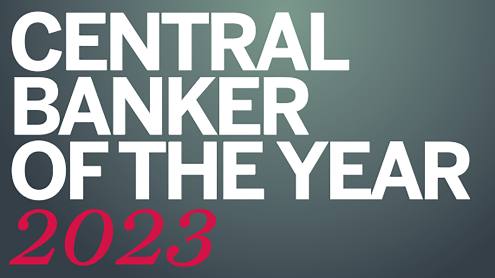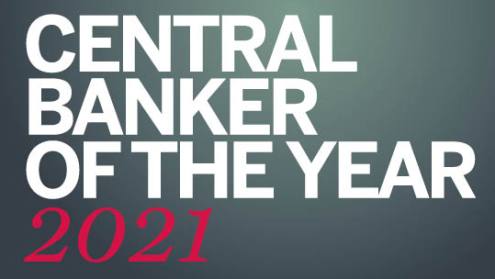Global and Asia-Pacific
Benjamin Diokno, Bangko Sentral ng Pilipinas
Creating a strong banking sector that supports individual consumers while moving forward with the digital banking agenda has been the goal of the 2022 winner of Central Bank Governor of the Year award.
Benjamin Diokno, governor of Bangko Sentral ng Pilipinas (BSP), has helped to see the Philippines through the Covid-19 pandemic, and pushed ahead with his modernisation agenda for the country’s banking system.
After seeing a 9.6% decline in gross domestic product during 2020, the economy has rebounded during 2021, recording a 12% increase in the second quarter and a 7.1% rise during the third quarter of the past year.
With inflation having an impact globally, Mr Diokno has taken the stance of holding interest rates low (2%) for as long as possible to maintain stability. Believing that the current environment is transitory, he decided to hold on to an accommodative monetary policy to support the economy.
In seeking to bring the Philippines in line with its neighbours, he has advocated a cash-lite economy, to encourage the move to digital payments. Tied to this, he is supporting local payment providers through the use of the national ‘QR PH’ standard for QR code payments, which are increasing and on track to reach the target of 50% of all payments by 2023.
Bringing more Filipinos into the formal banking sector through digital banking will help to reduce the number of unbanked citizens, which stood at 51.2 million in 2019, with only 29% of the adult population holding a bank account.
Recognising that the move to digital payments could leave some citizens behind, Mr Diokno pledged to bolster existing financial literacy programmes with additional support in digital skills development. He has called for customer centricity across the whole financial space, including insurance and capital markets, to help the underserved feel comfortable and secure accessing financial services. Greater levels of regulation are also being introduced to payment providers to protect consumers from fraud.
To build a stronger banking sector in the Philippines, Mr Diokno has called for more mergers and acquisitions (M&As) between local banks, as fewer, larger institutions would be better placed to withstand external shocks. A memorandum of agreement, signed on November 2021 by the BSP, Philippine Deposit Insurance Corporation, Securities and Exchange Commission, Co-operative Development Authority and Philippine Competition Commission, pledged to allow bank M&As to proceed within 55 days, down from the average of 160 days.
Mr Diokno has been vocal about supporting the transition to a low-carbon society in the Philippines. The ‘Green Force’, an 18-agency technical working group headed by BSP, was created to ensure the flow of funds into green projects. The group also launched the Philippine Sustainable Finance Roadmap, outlining its core principles. From the central bank’s side, Mr Diokno has pledged to create a regulatory environment that supports managing environmental risk and financing for sustainable activities.
Commenting on the award, Mr Diokno says: “I am truly honoured to be named The Banker’s Global Central Bank Governor of the Year. This award recognises the effort we at the Philippine central bank, BSP, have put forth over this past year, amid extraordinary challenges. While the entire world has been affected by the pandemic, the BSP has implemented policy responses to enable the Philippines to adapt to new ways of working, doing business and living. Looking ahead, alongside my colleagues at the BSP, I will continue to work toward a stronger, more technologically savvy, more inclusive, and more sustainable Philippine economy.”
Central Banker of the Year, Americas
Julio Velarde, chairman,
Central Reserve Bank of Peru
Few in Latin America have held a post and enjoyed sustained international respect for as long as Julio Velarde has. At the helm of Peru’s central bank since 2006, Mr Velarde has remained a calming figure, both in political and economic terms, even during tumultuous times. During his tenure, the country has been run by seven different presidents.
Most recently, Mr Velarde’s mere acceptance to continue in the post for yet another term, after having announced his retirement, was sufficient to reassure markets fretting over the appointment of a president that some depicted as a far-left extremist. Mr Velarde’s handling of the repercussions of the pandemic should also be noted, as Peru and its economy have also been among the worst hit by the pandemic in Latin America, with disproportionately high numbers of deaths and prolonged lockdowns. Much of the economy still relies on unofficial work.
The decline in economic activity had severe implications on liquidity, to which the central bank responded with prompt measures, including not only considerable direct monetary injections to support the payment system, but also a drop in the policy rate to historically low levels.
Commenting on the award, in a characteristically matter-of-fact style, Mr Velarde lists the actions taken by the institution. “In 2020, the Central Reserve Bank of Peru (BCRP) set out to address the challenges posed by the Covid-19 outbreak by providing strong and unprecedented monetary stimulus. In this critical context, the BCRP reduced its policy rate to a historic low of 0.25% and performed massive liquidity operations, amounting to 8% of gross domestic product, to sustain the payments system and credit flows,” he says.
“These policies were possible due to monetary policy credibility gained by achieving low inflation,” he adds. “In mid-2021, with economic activity recovering to pre-pandemic levels, the BCRP began to withdraw monetary accommodation gradually in a context of global inflationary pressures.”
The Banker does not offer a lifetime achievement award to central bank governors, but if it did, Mr Velarde would be a strong candidate for the Latin American trophy.
Central Banker of the Year, Europe
François Villeroy de Galhau, Banque de France
Banque de France’s (BDF) governor François Villeroy de Galhau certainly proved his mettle in the face of the Covid-19 pandemic, preserving the stability of the EU’s largest banking sector. Unsurprisingly, at the end of his first six-year term, he was reappointed for a second term in October 2021.
But Mr Villeroy de Galhau is as much an innovator as he is a steady pair of hands. During his tenure, he has pushed the envelope in many areas, including fintech, central bank digital currencies (CBDCs) and sustainability.
A few notable initiatives on the fintech side include launching the central bank’s Innovation Lab in 2017 and, more recently, embedding innovation in its ‘Building 2024 together’ strategic plan. He has also driven forward experimentation on wholesale CBDC with fintechs, public and private market participants and other central banks, starting in 2020. In December 2021, BDF announced the completion of Project Jura, which explored cross-border settlement using wholesale CBDC, in collaboration with the Bank for International Settlements, Swiss National Bank and six private-sector firms.
Mr Villeroy de Galhau has consistently promoted the role central banks can play in addressing climate change. In addition to creating the Network for Greening the Financial System in 2017, just two years later, the BDF was the first Eurosystem central bank to publish a yearly dedicated report on its responsible investment policy; more recently, in March, it set up its Climate Change Centre. The Autorité de Contrôle Prudentiel et de Résolution, operating under the auspices of the central bank, launched the first climate related stress tests, whose results were published in May 2021.
Yet, in light of all this activity, he believes his biggest achievement in the past year was engaging with more than 320,000 French citizens during the central bank’s interactive meetings on monetary policy — a testament to his democratic disposition.
According to Mr Villeroy de Galhau, his second term will not only be green, but also have a “white mandate”. In his words, this means “still accelerating with the BDF, given the speed of the technological disruption”. He will be focused on CBDCs, Markets in Crypto Assets regulation, the European Payments Initiative and fintech ecosystems. “On these four fronts, 2022 will be decisive,” he adds.
Central Banker of the Year, Middle East
Rasheed M Al-Maraj, Central Bank of Bahrain
With several Middle Eastern central banks witnessing changes at the top in the past few years, Rasheed M Al-Maraj has proved a bastion of stability, occupying the role of governor of the Central Bank of Bahrain (CBB) since 2005. Throughout his tenure, Bahrain’s financial sector — one of the most established in the region — has won a reputation for cutting-edge innovation, with one of the Gulf region’s most established fintech ecosystems.
Mr Al-Maraj is the winner of The Banker’s 2022 Central Banker of the Year for the Middle East. The award recognises both his role in further pushing the envelope when it comes to encouraging innovation and his stewardship of the sector during challenging times.
“I am pleased to receive this recognition from The Banker,” he says. “This achievement is due to my team’s contributions at CBB and could not have happened without their support and dedication. Despite the challenging time that we faced over the past two years, due to Covid-19, the CBB continued to advance the innovation agenda to broaden the regulatory framework of the new fintech business models.”
Bahrain’s economy suffered the second-worst impact in the Gulf Co-operation Council during 2020, behind Kuwait, with lower oil prices, local lockdowns and restrictions on international travel hitting the country hard. In the face of such realities, the CBB began 2021 by keeping supportive measures in place for six months, easing the pressure on struggling lenders. These measures were eventually extended until the end of the year. Local banks continue to maintain more than adequate capital and liquidity levels.
Even during such difficult times, the CBB has continued to innovate under Mr Al-Maraj’s watch. In May, the bank announced its oversight of a partnership with local lender Bank ABC and JPMorgan to pilot cross-border digital currency payments using JPMorgan’s Onyx platform.
Also of note was the CBB’s award of an open banking licence to local telecoms operator Batelco in July, making the telco one of the first in the region to be permitted to offer services such as digital wallet creation, bank account payments initiation and card initiation services.
A further highlight was the December launch of a refreshed framework for the CBB’s Regulatory Sandbox, first launched in 2017, enhancing its eligibility criteria and streamlining the overall process.
Central Banker of the Year, Africa
Florens Luoga, Bank of Tanzania
Despite a difficult 2020, Tanzania’s banking sector has remained stable in the main, with a capital adequacy of 15.7% at the end of the year and lenders posting modest growth in assets.
The sector remains significantly oversupplied, despite recent consolidation, with more than 50 licensed banks and non-bank financial institutions (NBFIs) at end-2020. Perhaps more concerningly, non-performing loans (NPLs) have grown sharply, particularly among small and medium-sized banks and NBFIs, with overall NPLs increasing to 9.4% of total loans as of March 2021.
Appointed as governor of Bank of Tanzania (BoT) in 2018, Florens Luoga is the winner of The Banker’s Central Banker of the Year for Africa for 2022, in recognition not only of his efforts to install greater discipline among local lenders but also of the BoT’s experimentation with a central bank digital currency, making it a pioneer on the continent.
Since the start of his tenure, Mr Luoga has overseen the continued consolidation of the sector that began in 2015 with the raising of minimum capital requirements. In November 2020, the BoT took over the management of China Commercial Bank (CCB) and placed it into administration after it failed to meet the required capital standards. Under the central bank’s guidance, CCB’s assets were acquired by NMB Bank in March 2021. BoT is in the process of overseeing several other potential mergers.
In a bid to help reduce NPL levels to the BoT’s target rate of 5%, Mr Luoga announced a crackdown on irresponsible lending in November, requiring banks to provide details of employees and government officials that had approved loans without following appropriate procedures. Such individuals face being blacklisted by the BoT and prevented from working in the country’s financial sector.
At the other end of the spectrum, Mr Luoga announced in July that the central bank was easing restrictions on lending to small businesses in a bid to boost credit to the sector. The BoT has introduced special loans to banks and NBFIs worth TSh1tn ($434m) earmarked for lending to the private sector.
It was reported in late November that the BoT was planning to follow the lead of Nigeria in introducing a digital shilling. No timing has been announced regarding its launch.






